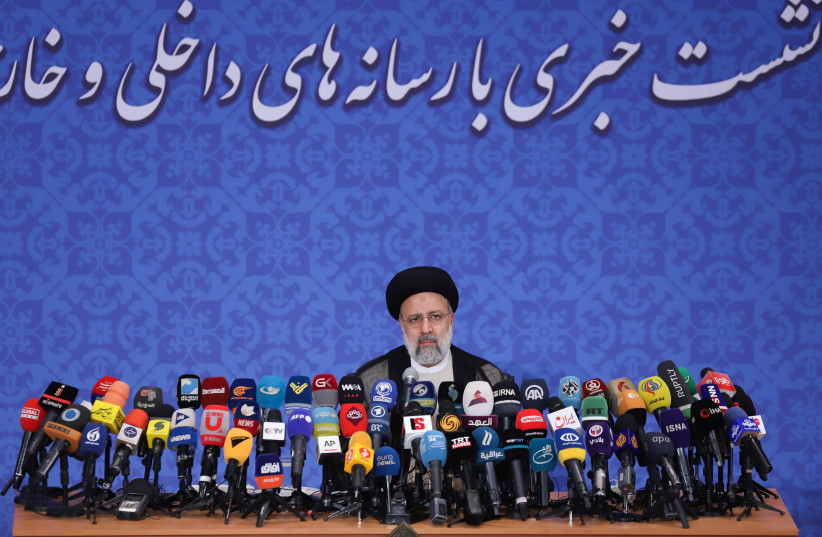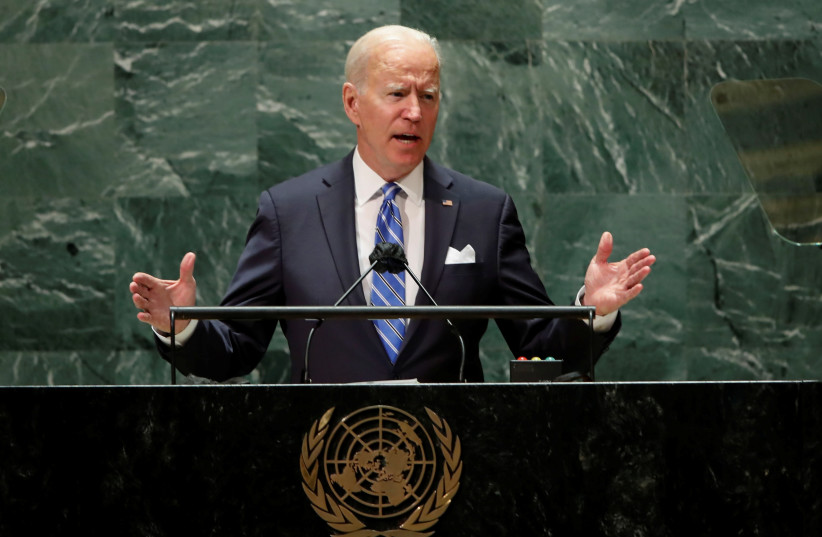Biden’s olive branch, Raisi’s slap in the face: US President Biden and Iranian president Raisi’s speeches signal return to negotiations but leave much room for uncertainty.
By YONAH JEREMY BOB
SEPTEMBER 21, 2021 22:00

The UN speeches of US President Joe Biden and Iranian President Ebrahim Raisi signaled a return to negotiations regarding the nuclear standoff, but still left significant uncertainty regarding the outcome.
The clearest message from the speeches was likely that, for now, Washington is still following Tehran’s script.
Raisi punches and repeatedly insults both the Trump and Biden administrations while the US president turns the other cheek, hoping his restraint will allow diplomacy to kick the Iran nuclear can down the road.
cnxps.cmd.push(function () { cnxps({ playerId: ’36af7c51-0caf-4741-9824-2c941fc6c17b’ }).render(‘4c4d856e0e6f4e3d808bbc1715e132f6’); });
That means even though there was basically a deal in hand under the previous Iranian government in May for a reciprocal return to the 2015 JCPOA by both parties, the Biden administration is ready to engage in new negotiations – whose results would either be the same or lead to new American concessions.
The premise of Biden’s approach has been that he is ready to give up US leverage of worldwide sanctions on Iran if the ayatollahs will cease their 60% uranium enrichment violation of the JCPOA and fully restore International Atomic Energy Agency inspections.
In theory, Washington has said it also wanted an Iranian commitment to continue toward an add-on negotiation to make the JCPOA longer and stronger.
But the US has reportedly already made new concessions beyond the JCPOA. They include allowing Iran to store, instead of destroy, its new fleet of advanced centrifuges for enriching uranium at higher speeds, as well as repealing some Trump-era nuclear sanctions.
Despite those concessions by the US, Raisi has enjoyed letting America flail in the wind for nearly four months to wear down its will to hold to its remaining redlines.
Former Israeli prime minister Ehud Barak also speculated on Monday in an editorial in Yediot Aharonot that the Islamic Republic may be concealing portions of its 60% highly enriched uranium before IAEA inspectors get a handle again on the state of the nuclear program.
Barak warned that once uranium is highly enriched, it is easier to conceal and easier to activate a clandestine program to complete the weaponization up to 90%.
Nothing in Biden’s comments about Iran indicated any urgency or any specific determination to thwart these new potential threats even as he repeated the constant generic US commitment to prevent Iran from obtaining a nuclear weapon.
The US president has a bully pulpit and had the capability at his UN speech to flip the script on Iran, but there was no attempt to do so.
In contrast, his main message was that he is shifting the US away from using force worldwide.
That diplomacy is important to US policy is not a new message. But taken against the backdrop of the US withdrawal from Afghanistan and Biden’s emphasizing the US is not at war anywhere, the message indicated that he will be less likely to use force than even some of his predecessors of either US political party.
Biden also tossed Iran in with North Korea in a list of crises he hopes to resolve through positive engagement. Obviously, he emphasized different tactics for each. Yet, even associating the two as he did could be symbolic of a US grudging readiness to allow Iran to get a nuclear weapon the same way Pyongyang did, despite a clear preference to prevent this.

US President Joe Biden addresses the 76th Session of the UN General Assembly in New York City (credit: REUTERS/EDUARDO MUNOZ/POOL)
Every time a major US official such as Biden, US Secretary of State Anthony Blinken or lead Iran negotiator Rob Malley repeat that their patience for Iran is not endless, without setting a deadline for negotiations or at least a freeze in 60% uranium enrichment, the United States’ determination is exposed as hollow.
Raisi came out all guns blazing (in the verbal sense) in his speech, with no urgency to return to the JCPOA, and essentially focused on his demand for the US to lift sanctions – which he called a war crime (he conveniently ignored or denied all of Iran’s actual war crimes.)
It now seems clear that Raisi’s script was meant to maximize a period of months to advance Iran’s understanding of more advanced aspects of nuclear weapons development and proximity for reaching a weapon, while pressuring the US for new concessions.
Due to Iran’s physical and knowledge gains in the nuclear arena, a return to the JCPOA in October, December or 2022 will not have the same meaning in blocking Iranian progress toward a nuclear weapon that it might have had back in May.
A deal arising from expected renewed negotiations in the coming weeks can still stop any imminent Iranian nuclear threat to cross the nuclear threshold of having sufficient weaponized uranium for a nuclear bomb.
But Raisi has exposed how unlikely it is that Biden will act decisively unless Tehran is beyond weaponizing enrichment and close to being ready to actually deploy a nuclear weapon.
Even in that scenario, there is a growing likelihood that Israel would be left to act alone, should any country be ready to use force to stave off such a potential Iranian nuclear threat.
In this way, Raisi appears to be firmly in control of the current nuclear script.
Content retrieved from: https://t.co/vN3wv9ui9s?amp=1.